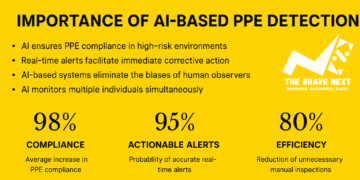Artificial Intelligence (AI) has already transformed the way we live, work, and interact with technology. From virtual assistants like Siri and Alexa to self-driving cars and personalized recommendation systems, AI is deeply embedded in our daily lives. But what does the future hold for this rapidly evolving field? The next few decades promise advancements that will reshape industries, societies, and even our understanding of intelligence itself. This article explores the potential trajectories of AI, focusing on its technological breakthroughs, societal impacts, ethical considerations, and the challenges we must navigate to harness its full potential.
Advancements in AI Technology
Significant leaps in its capabilities will likely define the future of Artificial Intelligence. One major area of development is general intelligence, often referred to as Artificial General Intelligence (AGI). Unlike today’s AI, which excels at specific tasks like image recognition or language translation, AGI would possess the ability to perform any intellectual task a human can do. While we’re still years, if not decades, away from true AGI, researchers are making strides in creating more versatile and adaptable AI systems. These systems could learn new tasks with minimal training, much like humans adapt to new challenges.
Another exciting frontier is AI’s integration with other technologies. For example, combining AI with quantum computing could exponentially increase processing power, allowing AI to solve complex problems—like optimizing global supply chains or simulating molecular structures for drug discovery—in seconds. Similarly, advancements in neuromorphic computing, which mimics the human brain’s structure, could lead to AI systems that are more energy-efficient and capable of learning in real-time.
AI is also expected to become more context-aware and emotionally intelligent. Future AI systems might understand not just what we say but how we feel, using tone, facial expressions, and context to respond more naturally. Imagine a virtual assistant that senses your frustration during a conversation and adjusts its tone to be more empathetic. This could revolutionize customer service, mental health support, and even education.
Transforming Industries
The impact of AI on industries will be profound. In healthcare, AI is already aiding doctors by analyzing medical images and predicting patient outcomes. In the future, AI could enable personalized medicine, where treatments are tailored to an individual’s genetic makeup. Predictive AI models might identify diseases before symptoms appear, allowing for earlier interventions. Robotic surgeons, guided by AI, could perform complex procedures with unprecedented precision.
In education, AI could create personalized learning experiences. Adaptive learning platforms might analyze a student’s strengths and weaknesses, tailoring lessons to their needs. Virtual tutors powered by AI could provide one-on-one support, making education more accessible, especially in underserved regions. However, this raises questions about equitable access to such technologies and the potential for over-reliance on automated systems.
The workplace will also see dramatic changes. AI is already automating repetitive tasks, from data entry to manufacturing. In the future, AI could take on more creative roles, such as designing products or generating marketing campaigns. While this could boost productivity, it also raises concerns about job displacement. The challenge will be to reskill workers for roles that complement AI, such as overseeing AI systems or focusing on uniquely human skills like creativity and empathy.
Societal Impacts
AI’s influence will extend beyond industries to reshape society itself. One exciting possibility is smart cities, where AI optimizes traffic flow, reduces energy consumption, and enhances public safety. For example, AI could analyze real-time data from sensors to prevent traffic jams or predict infrastructure failures before they occur. However, this level of connectivity requires robust cybersecurity to prevent hacking or misuse of data.
In entertainment and culture, AI could create entirely new experiences. Imagine movies where AI generates personalized storylines based on your preferences or virtual reality worlds designed in real-time by AI. Musicians and artists might collaborate with AI to produce innovative works, blending human creativity with machine precision.
Yet, these advancements come with risks. Data privacy is a growing concern as AI systems rely on vast amounts of personal information to function. Future regulations will need to balance innovation with protecting individual rights. Additionally, AI could amplify social inequalities if access to advanced technologies is limited to wealthy nations or corporations.
Ethical Considerations
As AI becomes more powerful, ethical questions become more pressing. One major issue is bias in AI systems. If trained on biased data, AI can perpetuate stereotypes or discriminate in areas like hiring or criminal justice. Future AI development must prioritize fairness, with transparent algorithms and diverse datasets to minimize bias.
Another concern is autonomy and accountability. As AI systems make more decisions—such as in autonomous vehicles or medical diagnostics—who is responsible when things go wrong? Establishing clear guidelines for AI accountability will be crucial. Some experts advocate for “explainable AI,” where systems can clearly articulate their decision-making processes to humans.
There’s also the question of AI’s role in warfare. Autonomous weapons, sometimes called “killer robots,” could make decisions without human oversight, raising moral and safety concerns. International agreements may be needed to regulate such technologies and prevent misuse.
Challenges and Opportunities
The road to AI’s future is not without obstacles. Technical limitations, such as the high energy demands of training large AI models, must be addressed to make AI sustainable. Researchers are exploring ways to make AI more efficient, such as through smaller, more specialized models that require less computing power.
Public trust is another hurdle. Misinformation about AI—fueled by science fiction or exaggerated claims—can lead to fear or skepticism. Clear communication about what AI can and cannot do will be essential to gain public support. Engaging communities in discussions about AI’s development can also ensure that it aligns with societal values.
On the opportunity side, AI could help solve some of humanity’s biggest challenges. In climate change, AI could optimize renewable energy systems, predict natural disasters, and model the impacts of environmental policies. In global health, AI could accelerate vaccine development or track disease outbreaks in real-time. These applications highlight AI’s potential to be a force for good when guided by ethical principles.
The Human-AI Partnership
Perhaps the most exciting aspect of AI’s future is its potential to augment human capabilities. Rather than replacing humans, AI could act as a partner, enhancing our ability to solve problems, create, and connect. For example, AI could assist scientists in discovering new materials or help artists explore new forms of expression. This partnership will require humans to adapt, learning to work alongside AI while maintaining critical thinking and emotional intelligence.
Education will play a key role in preparing people for this future. Schools and universities may need to teach “AI literacy,” helping students understand how AI works and how to use it responsibly. Lifelong learning programs can help workers stay competitive in an AI-driven economy.
Conclusion
The future of artificial intelligence is both thrilling and complex. With advancements in general intelligence, integration with cutting-edge technologies, and applications across industries, AI has the potential to revolutionize our world. However, it also brings challenges, from ethical dilemmas to societal impacts that require careful navigation. By fostering collaboration between technologists, policymakers, and communities, we can shape an AI future that is inclusive, equitable, and beneficial for all. The journey ahead will demand creativity, responsibility, and a shared vision to ensure that AI serves as a tool for human progress rather than a source of division.






















